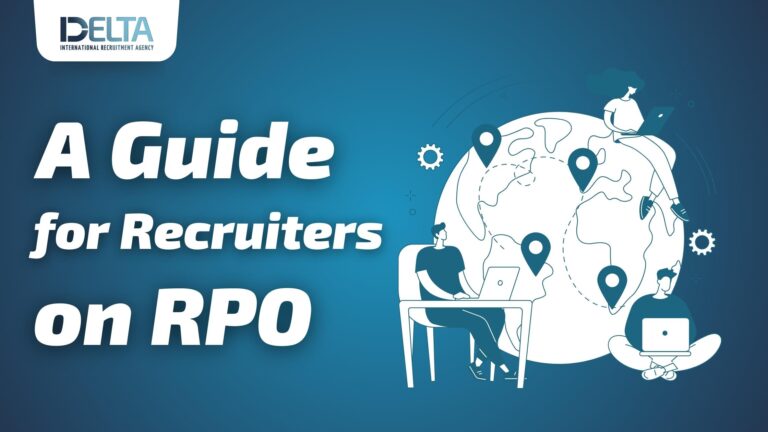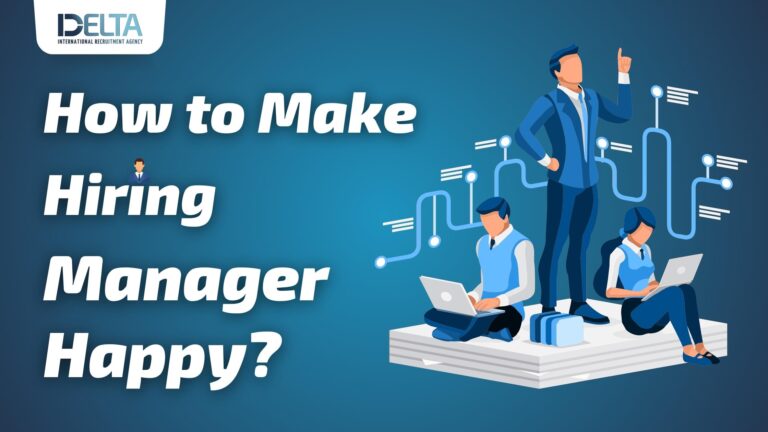To handle the demand for new hires and make it easier to find the right people, companies turned to RPO outsourcing. This helped them grow and save money by using technology and expert support. If you’re thinking about improving how you find new talent with RPO, this guide for recruiters can help!
"" 2023 Businesses Market Research show that using RPO can cut annual hiring costs by 38%, and 69% of new hires feel really connected to their work.""
What RPO Stands For
Full Form of RPO is “Recruitment Process Outsourcing”.
What does RPO Recruitment mean?
RPO involves a company outsourcing its hiring tasks to an external firm dedicated to recruitment functions and tasks.
How does Recruitment Process Outsourcing (RPO) operate?
RPO, a subset of Business Process Outsourcing (BPO), acts as an extension of a company’s internal HR department. Its goal is to boost efficiency, cut costs, speed up hiring, and tap into a more diverse talent pool.
The connection between the RPO provider and the employer is based on a contract. RPOs simplify the hiring process by handling tasks like finding, screening, and assessing qualified candidates.
Roles and Responsibilities
Roles and Responsibilities of Recruitment Process Outsourcing (RPO)
RPO companies play a crucial role in offering both on-site and off-site recruitment support to organizations. They are tasked with efficiently planning and executing the entire hiring process. Here are a few additional points to consider:
- RPOs must focus on talent and hiring manager engagement.
- Candidate management is crucial for RPOs to bring quality talent on board.
- RPO staffing works on strategic sourcing to attract top talents.
- Compliance and risk management come in handy with RPOs.
- RPO providers offer employer brand consulting to develop a good brand image and improve the candidate experience.
- RPOs provide recruitment analytics reports and also conduct pre-employment screening.
- Vendor partnering and supply chain management are the back-end responsibilities of RPO providers.
- They develop a network of early graduates and college pass-outs to keep the unrepresented candidates within the talent pool.
Categories of RPO Solutions in the Market
Comprehensive RPO
This is an ongoing solution encompassing all Recruitment Process Outsourcing services related to permanent hiring, including investments in hiring technology. Due to its complexity, executing full RPO can be challenging. However, it offers the best savings, efficiency, hiring outcomes, satisfaction, and compliance. Your RPO provider will handle tasks from strategic workforce planning to sourcing, selection, evaluation, offer management, and onboarding.
Project-Centric RPO
Similar to comprehensive RPO, project-centric RPO manages the entire hiring cycle but for a specific project or duration. This RPO solution is suitable for companies facing talent shortages due to business expansion or the launch of new ventures. Project-centric RPO allows you to maintain internal hiring capabilities for routine recruitments while benefiting from comprehensive RPO for specific hiring initiatives.
On-Demand RPO
Small businesses may experience disruptions in the hiring process during sudden spikes in recruitment, such as new product launches or creative endeavors. To meet seasonal hiring demands for quality talents and manage the recruitment workflow during such spikes, firms opt for on-demand RPO. RPO professionals enhance the capacity of the internal team without altering the hiring process.
Modular RPO
Recruitment Process Outsourcing companies offer modular or selective RPO to firms looking to strengthen specific aspects of their internal hiring process. It is a demand-based approach that provides expertise in tasks requiring a large workforce. Typically, firms outsource candidate sourcing and screening to RPO providers to expedite the initial stages of the hiring process. However, you can also seek administrative support, assistance in candidate management, or any other specific component.
What do RPO services for?
The way companies find and hire people is changing a lot. Now, it’s more about focusing on people. There’s a lot of competition because of new ways to find job candidates. Many routine tasks are done automatically, and how companies hire is now part of their overall plan.
RPO services are the help that RPO companies give in the hiring business. These companies keep up with what’s happening and adjust how they help to give good solutions to employers. Here are some ways Recruitment Process Outsourcing hiring can be helpful:
- RPO experts and new tools can help find and screen candidates.
- RPO is good for understanding the job market and making plans to stay ahead.
- Executive search and headhunting are things RPO services can do.
- RPO can help a company grow and not waste resources by handling compliance and admin tasks.
- Managing candidate databases, portal management, and checking references are part of RPO services.
- RPO providers can take care of the whole hiring process for a company.
- RPO services can also handle a company’s finances and accounts, including bills, payments, account management, time and expense management, payroll, and credit control.
Advantages of RPO for Businesses
1) E Access to the Best Talent
RPO companies have a diverse talent pool for in-demand skills and domains. Additionally, many Recruitment Process Outsourcing providers have expanded networks of colleges and placement firms that enable them to attract qualified but underrepresented candidates.
2) Enhanced Candidate Experience
RPO services offer the flexibility of automating and optimizing recruitment processes based on specific needs. Recruitment Process Outsourcing providers customize job portals to boost candidate engagement, craft clear and relevant job descriptions, remove obstacles that disrupt the hiring flow, and simplify the application process for candidates.
Additionally, they make communication between employers and hires easy, respond promptly to applicant queries, and maintain transparency in the hiring process. This helps build a positive employer brand image and provides an enhanced candidate experience.
3) Cost Savings in Hiring
RPO is adaptable, lessening a company’s reliance on external agencies and maximizing the benefits of a unified hiring system. Additionally, by optimizing each stage of hiring, RPO lowers the cost per hire. You can choose an Recruitment Process Outsourcing model that suits your company’s needs, ultimately managing the overall recruitment budget and making the process more cost-effective.
4) Reduced Hiring Costs
RPO is flexible, reducing a company’s dependence on external agencies and maximizing the advantages of a unified hiring system. Moreover, by optimizing each step of the hiring process, RPO reduces the cost per hire. You can select an Recruitment Process Outsourcing model that fits your company’s requirements, effectively overseeing the overall recruitment budget and enhancing the cost-effectiveness of the process.
5) Reduction in Recruitment Time
Recruitment Process Outsourcing can cut down on your hiring manager’s time by up to 55%. Additionally, RPO enhances the entire hiring process. Recruitment Process Outsourcing providers have a skilled team of hiring professionals familiar with the competitive talent acquisition market. As a result, they quickly secure high-quality hires by incorporating advanced technologies such as Recruitment Chatbots and updated hiring strategies.
Success Factors in RPO Implementation
A successful RPO implementation finds a balance between the need for quick results and the long-term success of the hiring process. Let’s look at the factors that make it happen.
-
Understanding the Current Situation
Recruitment Process Outsourcing providers study the current hiring process of the internal talent acquisition team through a detailed survey. This helps them create an effective plan by recognizing the current business solutions and the overall business environment.
-
Getting Support from the Organization
Once the RPOs understand how the company currently hires, they work on gaining support from the talent acquisition team to make necessary changes. Gaining the trust of the internal HR team is important to implement improvement methods.
-
Training and Working Together
In an RPO partnership, the role of the internal HR team is crucial. RPO professionals might train internal recruiting managers on the best recruitment practices, introducing updated hiring technology and recruitment automation tools. They collaborate with hiring staff to understand company policies and culture, creating a suitable talent pool.
-
Using Technology
Recruiters and employers both agree that technology in hiring makes things simpler and faster. Recruitment Process Outsourcing providers recognize the recruitment needs of the company and suggest the right technology for present and future needs.
-
Fixing Issues
A successful Recruitment Process Outsourcing implementation meets the long-term needs of the company. The RPO team works to solve any problems or obstacles that come up during the launch process. They also keep the team trained to follow new procedures and use new resources.
How RPO Differs from a Staffing Agency
Peopl often confuse RPO companies with staffing agencies. Even though both help organizations with hiring, they have different goals.
RPO companies handle some or all of a company’s recruiting functions. They specialize in hiring and focus on helping the company achieve long-term hiring goals.
Staffing agency on the other hand, meet short-term hiring needs. They usually get involved in the middle or last stages of the hiring process. Here are some key differences:
- RPO companies provide end-to-end hiring, while staffing agencies focus on usual staffing roles.
- RPOs manage service level agreements (SLAs), while staffing agencies stick to defined target achievements.
- RPOs use data and analytics for hiring, while staffing agencies rely more on manual processes.
- RPOs work on engaging both employers and potential employees, but staffing agencies contribute less to employer branding and talent engagement.
- Hires from staffing agencies may not always meet company requirements, as they focus more on filling positions than finding the right fit. RPOs suggest top talents that align with company policies.
RPOs are considered more reliable and cost-effective than staffing agencies. RPOs charge a fixed management fee, while staffing agencies charge a contingency fee.
The main goal of an Recruitment Process Outsourcing provider is workforce planning, while a staffing agency mainly aims at talent supply.
Closing Remarks on RPO
Recent reports predict that the global Recruitment Process Outsourcing industry will likely reach $20.8 billion by 2027. It’s essential for clients to fully grasp the potential of their partnerships. Whether RPO will enhance your business’s hiring process depends on how you choose your RPO HR.
Start by understanding your business needs, identify why you opted for RPO, and then create an effective strategy to follow. Once you’ve sorted out these steps, you can approach leading RPO companies to meet your company’s recruitment needs.
Tips of Jobs Seekers: A Guide for Recruiters on Recruitment Process Outsourcing (RPO)




 in Saudi Arabia.png)